Suggest a new Definition
Proposed definitions will be considered for inclusion in the Economictimes.com
Space-Technology
What is 'ISRO'
Definition: The Indian Space Research Organization (ISRO) is the pioneer space exploration agency of the Government of India, headquartered at Bengaluru. ISRO was formed in 1969 with a vision to develop and harness space technology in national development, while pursuing planetary exploration and space science research. ISRO replaced its predecessor, INCOSPAR (Indian National Committee for Space Research), established in 1962 by India’s first Prime Minister Pt. Jawaharlal Nehru and scientist Vikram Sarabhai, considered amongst the founding fathers of Indian space program.
Description: ISRO, by successfully demonstrating its unique and cost-effective technologies, has gained place among the elite space agencies in the world over the years. The first Indian satellite, Aryabhata, was built by the ISRO and launched with the help of the Soviet Union on April 19, 1975. The year 1980 marked the launch of Rohini, which was the first satellite to be successfully placed in the orbit by SLV-3, an Indian made launch vehicle. Subsequently with more efforts, two other rockets were developed by ISRO: the PSLV (Polar Satellite Launch Vehicle) for placing satellites into polar orbits and the GSLV (Geosynchronous Satellite Launch Vehicle) for placing satellites into geostationary orbits. Both the rockets have successfully launched several earth observation and communication satellites for India as well as other countries.
Indigenous satellite navigation systems like IRNSS and GAGAN have also been deployed. In January 2014, ISRO used an indigenously built cryogenic engine for a GSLV-D5 launch of the GSAT-14 satellite making it one of the only six countries in the world to develop a cryogenic technology. Most recent and remarkable space probes of ISRO include Chandrayaan-1 lunar orbiter, Mars Orbiter Mission (Mangalyaan-1) and ASTROSAT space observatory. The success of the Mars Orbiter Mission made India only the fourth country in the world to reach the Martian orbit.
Description: ISRO, by successfully demonstrating its unique and cost-effective technologies, has gained place among the elite space agencies in the world over the years. The first Indian satellite, Aryabhata, was built by the ISRO and launched with the help of the Soviet Union on April 19, 1975. The year 1980 marked the launch of Rohini, which was the first satellite to be successfully placed in the orbit by SLV-3, an Indian made launch vehicle. Subsequently with more efforts, two other rockets were developed by ISRO: the PSLV (Polar Satellite Launch Vehicle) for placing satellites into polar orbits and the GSLV (Geosynchronous Satellite Launch Vehicle) for placing satellites into geostationary orbits. Both the rockets have successfully launched several earth observation and communication satellites for India as well as other countries.
Indigenous satellite navigation systems like IRNSS and GAGAN have also been deployed. In January 2014, ISRO used an indigenously built cryogenic engine for a GSLV-D5 launch of the GSAT-14 satellite making it one of the only six countries in the world to develop a cryogenic technology. Most recent and remarkable space probes of ISRO include Chandrayaan-1 lunar orbiter, Mars Orbiter Mission (Mangalyaan-1) and ASTROSAT space observatory. The success of the Mars Orbiter Mission made India only the fourth country in the world to reach the Martian orbit.
Related News
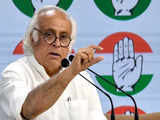 Before he goes into space, the non-biological PM should go to Manipur: Jairam RameshTaking to 'X', Ramesh, on July 4, wrote, "Before He goes into space, the non-biological Pradhan Mantri should go to Manipur." The media report has quoted ISRO Chief S Somnath as saying that PM Modi can be the candidate for India's first manned space mission, 'Gaganyan', which is slated to be launched in 2025.
Before he goes into space, the non-biological PM should go to Manipur: Jairam RameshTaking to 'X', Ramesh, on July 4, wrote, "Before He goes into space, the non-biological Pradhan Mantri should go to Manipur." The media report has quoted ISRO Chief S Somnath as saying that PM Modi can be the candidate for India's first manned space mission, 'Gaganyan', which is slated to be launched in 2025.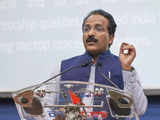 ISRO seeks active role in global efforts to shield earth from asteroidsISRO Chairman S. Somanath emphasized India's growing space exploration capabilities and readiness for asteroid research collaborations. With recent successful missions like Chandrayaan-3 and Aditya-L1, India aims to contribute significantly to global efforts in planetary defense and scientific discovery.
ISRO seeks active role in global efforts to shield earth from asteroidsISRO Chairman S. Somanath emphasized India's growing space exploration capabilities and readiness for asteroid research collaborations. With recent successful missions like Chandrayaan-3 and Aditya-L1, India aims to contribute significantly to global efforts in planetary defense and scientific discovery.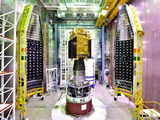 ISRO's Aditya-L1 completes first halo orbit around Sun-Earth L1 point in 178 daysIndia's first solar mission, Aditya-L1, completed its first halo orbit around the Sun-Earth L1 point, the Indian Space Research Organisation (ISRO) announced. Launched on September 2 last year, the Aditya-L1 spacecraft was inserted into its targeted halo orbit on January 6. It takes 178 days to complete a revolution around the L1 point. Station-keeping manoeuvres on February 22, June 7, and July 2 have maintained its orbit, with the latest manoeuvre ensuring it continues into the second halo orbit path. The mission's complex dynamics and trajectory planning have validated ISRO's in-house flight dynamics software.
ISRO's Aditya-L1 completes first halo orbit around Sun-Earth L1 point in 178 daysIndia's first solar mission, Aditya-L1, completed its first halo orbit around the Sun-Earth L1 point, the Indian Space Research Organisation (ISRO) announced. Launched on September 2 last year, the Aditya-L1 spacecraft was inserted into its targeted halo orbit on January 6. It takes 178 days to complete a revolution around the L1 point. Station-keeping manoeuvres on February 22, June 7, and July 2 have maintained its orbit, with the latest manoeuvre ensuring it continues into the second halo orbit path. The mission's complex dynamics and trajectory planning have validated ISRO's in-house flight dynamics software.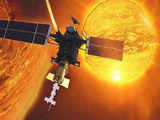 ISRO's Aditya-L1 completes first halo orbit around Sun-Earth L1 pointISRO's URSC validated the flight dynamics software for Aditya-L1 spacecraft, which completed its first halo orbit around the Sun-Earth L1 point in 178 days. The recent manoeuvre guaranteed the seamless continuation of its journey in the second halo orbit, illustrating ISRO's expertise in space exploration.
ISRO's Aditya-L1 completes first halo orbit around Sun-Earth L1 pointISRO's URSC validated the flight dynamics software for Aditya-L1 spacecraft, which completed its first halo orbit around the Sun-Earth L1 point in 178 days. The recent manoeuvre guaranteed the seamless continuation of its journey in the second halo orbit, illustrating ISRO's expertise in space exploration.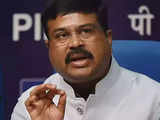 NEET exam row: Pradhan slams Cong, says it wants to run away from discussion in ParliamentUnion Education Minister Dharmendra Pradhan criticized the Congress on Saturday, accusing it of wanting to avoid a discussion in Parliament over the NEET exam issue. This statement follows Rahul Gandhi's request to Prime Minister Narendra Modi for a respectful and thorough discussion in Parliament on the alleged irregularities in the conduct of the NEET exam.
NEET exam row: Pradhan slams Cong, says it wants to run away from discussion in ParliamentUnion Education Minister Dharmendra Pradhan criticized the Congress on Saturday, accusing it of wanting to avoid a discussion in Parliament over the NEET exam issue. This statement follows Rahul Gandhi's request to Prime Minister Narendra Modi for a respectful and thorough discussion in Parliament on the alleged irregularities in the conduct of the NEET exam.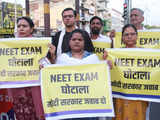 Centre's panel on exam reforms to engage with parents, students; take stock of concernsThe Education Ministry's exam reforms panel, led by former ISRO chief R Radhakrishnan, will consult with parents and students to address concerns over exam processes amid controversies surrounding NEET and NET exams. During its initial meeting, the committee reviewed NTA operations, focusing on developing a secure, flexible, and tamper-proof testing system.
Centre's panel on exam reforms to engage with parents, students; take stock of concernsThe Education Ministry's exam reforms panel, led by former ISRO chief R Radhakrishnan, will consult with parents and students to address concerns over exam processes amid controversies surrounding NEET and NET exams. During its initial meeting, the committee reviewed NTA operations, focusing on developing a secure, flexible, and tamper-proof testing system.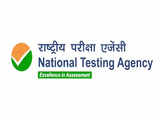 Centre's seven-member high-level panel formed to oversee NTA's functioning to hold meet, sourcesThe Centre's high-level committee overseeing the National Testing Agency (NTA) is set to meet on Monday to address transparency and operational issues. This committee, led by Dr. K. Radhakrishnan, will submit its recommendations on reforming the examination process and improving data security to the Ministry of Education in the next two months. The NTA, which conducted the NEET-UG exams, has faced criticism and allegations of irregularities, leading to protests and demands for its disbandment.
Centre's seven-member high-level panel formed to oversee NTA's functioning to hold meet, sourcesThe Centre's high-level committee overseeing the National Testing Agency (NTA) is set to meet on Monday to address transparency and operational issues. This committee, led by Dr. K. Radhakrishnan, will submit its recommendations on reforming the examination process and improving data security to the Ministry of Education in the next two months. The NTA, which conducted the NEET-UG exams, has faced criticism and allegations of irregularities, leading to protests and demands for its disbandment. Mend, don't throw away the safety NTAFixing NTA will also require regaining public trust. The committee must engage with stakeholders as well as experts, who can provide guidance on creating fail safes to localise and minimise impacts should the system be breached. Options for leveraging technology to improve the process and system - drawing on successful practices of similar organisations like ETS in the US - should be on the agenda.
Mend, don't throw away the safety NTAFixing NTA will also require regaining public trust. The committee must engage with stakeholders as well as experts, who can provide guidance on creating fail safes to localise and minimise impacts should the system be breached. Options for leveraging technology to improve the process and system - drawing on successful practices of similar organisations like ETS in the US - should be on the agenda.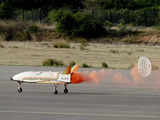 ISRO completes Reusable Launch Vehicle technology demonstrations under challenging conditionsISRO achieved a significant milestone with the successful third consecutive test of the Reusable Launch Vehicle Landing Experiment, demonstrating the autonomous landing capability of the launch vehicle under challenging conditions. Named 'Pushpak,' the winged vehicle executed cross-range correction maneuvers and a precise horizontal landing at the runway centerline after being released from an Indian Air Force Chinook Helicopter. This success reaffirms ISRO's expertise in acquiring critical technologies for the development of a Reusable Launch Vehicle.
ISRO completes Reusable Launch Vehicle technology demonstrations under challenging conditionsISRO achieved a significant milestone with the successful third consecutive test of the Reusable Launch Vehicle Landing Experiment, demonstrating the autonomous landing capability of the launch vehicle under challenging conditions. Named 'Pushpak,' the winged vehicle executed cross-range correction maneuvers and a precise horizontal landing at the runway centerline after being released from an Indian Air Force Chinook Helicopter. This success reaffirms ISRO's expertise in acquiring critical technologies for the development of a Reusable Launch Vehicle.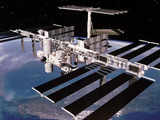 NASA to train ISRO astronauts for ISS tripNASA and ISRO collaborate to train an Indian astronaut for an ISS mission, enhancing Indo-US space partnership through iCET technology. NASA administrator Bill Nelson emphasised joint efforts to advance human spaceflight and benefit humanity. India and the US aim to deepen interoperability in space, provide advanced training for Indian astronauts, and launch the NASA-ISRO Synthetic Aperture Radar to combat climate change.
NASA to train ISRO astronauts for ISS tripNASA and ISRO collaborate to train an Indian astronaut for an ISS mission, enhancing Indo-US space partnership through iCET technology. NASA administrator Bill Nelson emphasised joint efforts to advance human spaceflight and benefit humanity. India and the US aim to deepen interoperability in space, provide advanced training for Indian astronauts, and launch the NASA-ISRO Synthetic Aperture Radar to combat climate change.
Load More